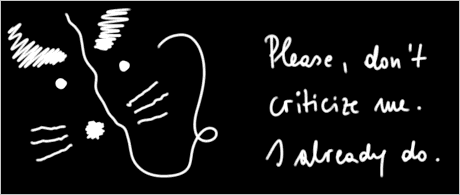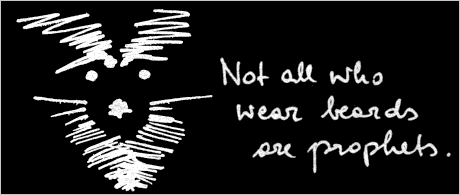Criticizing myself
February 23rd, 2007
Please don’t criticize us. We already do.
O me, man of slack faith so long!
Standing aloof—denying portions so long;
Only aware to-day of compact, all-diffused truth;
Discovering to-day there is no lie, or form of lie, and can be none, but grows as inevitably upon itself as the truth does upon itself,
Or as any law of the earth, or any natural production of the earth does(This is curious, and may not be realized immediately—But it must be realized;
I feel in myself that I represent falsehoods equally with the rest,
And that the universe does.)Where has fail’d a perfect return, indifferent of lies or the truth?
Is it upon the ground, or in water or fire? or in the spirit of man? or in the meat and blood?
Meditating among liars, and retreating sternly into myself, I see that there are really no liars or lies after all,
And that nothing fails its perfect return—And that what are called lies are perfect returns,
And that each thing exactly represents itself, and what has preceded it,
And that the truth includes all, and is compact, just as much as space is compact,
And that there is no flaw or vacuum in the amount of the truth—but that all is truth without exception;
And henceforth I will go celebrate anything I see or am,
And sing and laugh, and deny nothing.
Walt Whitman, All is Truth. First published in ‘Leaves of Grass’ 1855.

[Bearded Ratta has spoken: Not all who wear beards are prophets.]
Knowledge may be defined in many ways. Sure, quite a number of people writing and talking about knowledge do not even care about defining knowledge (sorry no references here in order to protect the innocent). Moreover, one might deny the existence of varying definitions, though, I — personally — would see this as a sign of a view on knowledge differing from my own view.
Apparently, some people take the delicate concept of disfinism a step further: We do not know what knowledge is, therefore, naturally, let’s do research on non-knowledge, respectively ignorance and the unknown. (Mind you, I am not talking of myself I am just a liar.) Of course, this research shall add to the existing (scientific) knowledge (in contrast to existing non-knowledge).
As a side note, here is one more hint on why disfinism is a safe bet: As long as one does not define the concepts one’s work is based on, or the area to which one’s work applies, one can carelessly produce whatever others buy (or even do not buy). And they will, because consistency rules.
But is it of any use? The work? The knowledge? This blog?
You might well ask! As an example, let’s provide a definition for knowledge. Say, knowledge is what can be put into use, and what leads to something useful. In this sense, we may want to define non-knowledge as what cannot be put into use, or is useless (not to mention that this definition could come in useful). Please note that this is only an example of perhaps minor use — depending on your definition of use. Also, you might want to limit this definition’s scope to what is nonphysical.
What happens as you start gathering (useful) knowledge while you try not to accumulate non-knowledge, while you try to separate what is useful from what is useless, while you weed out ignorance, while you warn your fellows of possible non-knowledge, intended ignorance, and the temporally unknown?
Here is an answer by Bill Watterson’s character Calvin:
The more you know, the harder it is to take decisive action. Once you become informed, you start seeing complexities and shades of gray. You realize that nothing is as clear and simple as it first appears. Ultimately, knowledge is paralyzing.
Being a man of action I can’t afford to take that risk.
Is this knowledge useful? It’s hard to decide, isn’t it!?
I prefer to know that I believe rather than to believe I know.
Believe it or not this is a personal quote. Heck, I think I should be glad that it dates way back about 20 years :) Nowadays, this quote puts a smile on my face. And, I don’t even have to replace “believe” with “not knowing” to add to the fun.
Oder wenn jemand schreibt
Ob es einen Unterschied gibt, zwischen »glauben zu wissen« und »wissen zu glauben« ist schlicht eine Glaubensfrage.
komme ich nicht umhin mich zu fragen, woher “die” das wissen.
[G (German)]
Here is a do-it-yourself reply to Cairo Otaibi‘s comment on Uncovered Truth:
[Credits to sigenori for the original animation; thanks to M.A. for the needed adaptations.]
